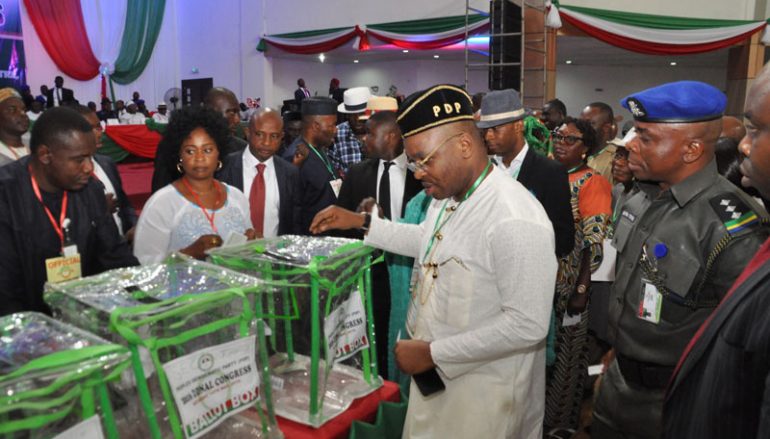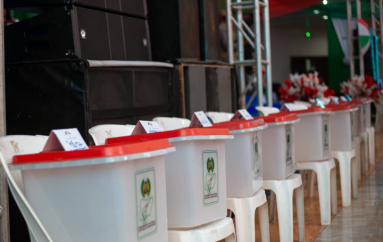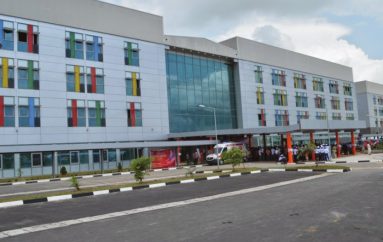
A’Ibom PDP: Maintaining Political Stability Through Zoning
By Etebong Akpan
One unique thing about the Peoples Democratic Party, PDP, is its ability to score first in major facets of democratic ideals, irrespective of the situation. Its logo; the Umbrella symbolises its accommodating culture and its ability to accept all shades of opinions and adapt with the prevailing reality which is lacking in other political parties.
Recent events in the country have shown clearly that the PDP, despite its perceived short comings, is truly the only political party that belongs to the people as its slogan; ‘power to the people’ connotes. Power, the key element in the political process, is evenly shared among the component units that make up the spectrum, thus giving every member of the party a sense of belonging and a platform to become anything politically.
Effiong Abia, a lawyer in his book, ‘The Big Umbrella’ summaries the position of the PDP on zoning thus: ”In forming the PDP, the founding fathers agreed that the only way to establish a truly national party was to create a new political order. To them, one way of creating a new political order in a political society like Nigeria was to address the issues of real and imaginary fear of domination and marginalization.
”They had a consensus of opinion that the issues could only be addressed if the principles of equity, fairness and justice are upheld in the new political party. That informed the adoption of the zoning principle by the PDP. To ensure its enforcement, the party included the zoning principle in its constitution, thereby giving it a legal backing,” Abia submitted.
The PDP Constitution in Article 7, sub-section 2(C) (2012 As Amended) states that the party share adhere to the policy of the rotation and zoning of party and public elective offices in pursuance of the principle of equity, justice and fairness.
”This was to foster a sense of belonging. Many Nigerians have argued that the zoning arrangement had been a part of our political history since the Second Republic,” again, Abia submitted.
Dan Agbese, quoted by Abia, asserted that the idea was first introduced by the National Party of Nigeria (NPN), during the Second Republic. In his words, according to The Big Umbrella, ”the zoning formula was not an original idea by the PDP. ”It was first broached by the National Party of Nigeria (NPN) in the Second Republic as part of the many national experiments in the country to: (a) Convince all Nigerians that they are as much stakeholders in the Nigeria project as anyone else, no matter how small their political units might be and, therefore: (b) fully entitled to lead as well as to be led. ”Another Nigerian who had also articulated the desirability of the zoning principle was Dr Ifedi Okwenna, Secretary-General of Eastern Leaders’ Forum. Dr Okwenna had in a paper, titled , Zoning, Rotation and the Power Struggle in Nigeria, Published by Elombah.Com, an online news site in 2011 states:
”The principle of zoning and rotation of power is a philosophy of power sharing which is as old as man’s existence on earth and is believed to be older than democracy itself. It is on record that the system was practiced in Athens and Sparta in particular by the Greeks .The Roman Empire used it with great profit. ”Zoning and rotation thus is not a novel idea, but a norm practiced over the years either as a convention or as a process of implementing the federal character principle. It is therefore an implied constitutional provision accepted by all segments of the Nigerian society.
”Okwenna, in the said paper, stressed the fact zoning and rotation principles are inherent in the democratic culture and are used to address the problems which characterize polyglot societies. He posited that zoning is a way of ensuring fair play, compromise and coexistence. He noted that although the principle of 18 years ago in Akwa Ibom, the PDP has remained consistent in creating a harmonious political relationship among the three senatorial districts through the zoning of political offices. This zoning arrangement, though not spelt out in black and white is what has sustained the party in the state this while. The declaration by Obong Victor Attah in April 2006 in Ikot Ekpene council hall during the swearing in of newly elected chapter chairmen in Akwa Ibom North-West Senatorial District that it was the turn of that senatorial district to produce his successor in 2007 was not documented.
The zoning arrangement, which is not limited to the office of the governor alone trickles to the ward level where the highest elected political office holder; the councillor is shared among the component units of the ward. This unwritten understanding has not only kept the PDP together, but has also created political stability in different parts of the state. When the military opened up the political space again in 1998, elders of the newly formed PDP met at the defunct Metro Hotel in Uyo on Friday, December 18, 1998, to take a decision on the governorship position.
At the end of the meeting, Obong Victor Attah from Uyo senatorial district was adopted as the consensus governorship candidate of the party. His major senatorial district, the position of the deputy governor was zoned to Ikot Ekpene senatorial district. The position of the speaker of the state house of assembly went to Eket senatorial district, including the position of the chairman of the party. Elections into other offices followed the same pattern of equal distribution of positions among the component units of the senatorial districts, federal constituencies, state constituencies as well as the council chairmanship and councillorship positions. At the end of the exercise, there was relative peace and political contentment in the state as the party did the needful by accommodating every member one way or the other.
John Udoedehe from Uyo federal constituency was elected as the senator for Uyo Senatorial district while Emmanuel Ibokessien from Ikot Ekpene federal constituency was elected the senator from Ikot Ekpene senatorial district. Eket senatorial district had Udoma Udo Udoma from Ikot Abasi federal constituency during that period. This arrangement was replicated at the ten federal constituencies across the state. The house of assembly election was not different as the 26 state constituencies brought out their representatives across party lines without much rancour.
During Obong Attah’s second term in 2003, the senatorial seat configuration was adjusted in Ikot Ekpene senatorial district as Chief Itak Ekarika from Ukanafun/Oruk Anam federal constituency became the new senator for the district. In Uyo, Effiong Dickson Bob from Etinan federal constituency replaced John Udoedehe.
“The PDP Constitution in Article 7, sub-section 2(C) ( 2012 As Amended) states that the party share adhere to the policy of the rotation and zoning of party and public elective offices in pursuance of the principle of equity, justice and fairness.”
The issue of zoning and rotation of political offices were strictly adhered to as members who emerged did so at the understanding of the people and the political stakeholders of the area. What this means is that at the house of assembly level, there is always a relationship between which area gets the council chairmanship ticket and the assembly ticket. The two tickets cannot remain in the same political zone no matter the quality of aspirants on display from one zone. Doing otherwise, could be an invitation to anarchy and chaos, which the opposition party would be eager to exploit.
This simple understanding has not only doused political tension in the state, but has also removed the word ‘marginalisation’ from the political lexicon of the state and instead replaces it with inclusiveness and accommodation.
After the constitutionally stipulated two-terms of eight years of Obong Victor Attah, there was power shift to Ikot Ekpene Senatorial District in 2007. It is on record that Obong Attah and the entire members of the PDP in the state supported the zoning of the office of the governor to Ikot Ekpene Senatorial District. That explained why many governorship aspirants came from the district.
The PDP took off on that note and sustained the tempo of zoning in the 2003 general elections in the state. At the end of a keenly contested PDP governorship primary in December 2006, Chief Godswill Akpabio went on to win the governorship election in 2007. The position of the deputy governor was zoned to Eket Senatorial District with particular emphasis on Ikot Abasi federal constituency because of the ethnic configuration of the zone. The outcome was the emergence of Engr. Patrick Ekpotu, Obong Nsima Ekere and Lady Valarie Ebe as deputies to Godswill Akpabio at various times before the conclusion of Akpabio’s tenure in 2015.
During that period, the position of the Speaker of the state house of assembly was zoned to Uyo senatorial district with Ignatius Edet, from Itu/Ibiono Ibom Federal Constituency; Anietie Etuk, Etinan Federal Constituency and Sam Ikon, Etinan Federal Constituency emerging as speakers at various times during the period. The office of the chairman of the party, as usual, went to Uyo Senatorial District with Uwem Ita Et u k , f r om Uyo Federal Constituency and Obong Paul Ekpo, Etinan Federal Constituency taking charge at various times. For the first time in the political history of the state, the people of Ikot Ekpene Senatorial District had to cede the senatorial seat in the area to Ikono /Ini Federal Constituency as part of the gentleman understanding.
The federal constituency went on to produce a senator in the person of Hon. Aloysius for the two terms that Akpabio served as the governor of the state. In the other senatorial zones, Eme Ekaette, from Eket Federal Constituency won the Eket senatorial seat in 2007, but lost to Senator Helen Esuene in 2011.In 2015, the political setting in the state was reconfigured to blend with the contemporary reality of the times.
The PDP zoned the governorship position to Eket Senatorial District, which was the last zone to have a foothold at government house, Uyo. At the end of the party primary, Mr. Udom Emmanuel from Eket Federal Constituency was declared as the standard-bearer of the party, while Moses Ekpo from Abak Federal Constituency in Ikot Ekpene Senatorial District became his running mate.
The general election was keenly contested against the candidate of the opposition, the All Progressive Congress, APC, Obong Umana Umana from Uyo Senatorial District, who had his running mate from Oron Federal Constituency of Eket Senatorial District.
The election polarised the state as the outcome was keenly contested by both parties with the PDP claiming the final victory at the Supreme Court. Despite the hassles of the opposition, the PDP still adhered to its zoning principle by allowing other component parts of the state to its representations in the offices zoned to it. In the senatorial district race, Oron Federal Constituency produced the senator for Eket Senatorial District in the person Senator Nelson Efiong, while Bassey Albert Akpan from Ibiono Ibom / Itu Federal Constituency, became the senator for Uyo Senatorial District. Chief Godswill Akpabio from Ikot Ekpene Federal Constituency was elected the senator for Ikot Ekpene Senatorial District.
Uyo Senatorial District also retained the position of the speaker of the house of assembly with Aniekan Uko from Uyo federal Constituency emerging as the speaker before Rt. Hon. Onofiok Luke from Etinan Federal Constituency succeeded him after the Appeal Court sacked the former. Obong Paul Ekpo from Etinan Federal Constituency was further returned as the state chairman of the party, thus becoming the first person to go for a second term in that office since the formation of the party in 1998.
Although Professor Itse Sagay believes that zoning is a function of political backwardness and immaturity, it has more or less given the people of the state a sense of belonging as all components units are allowed to aspire without any fear of the defects of a democracy which is the privileged of the majority.
Sagay’s position that no democracy can be sustained by the right of tribes to misrule, misgovern, plunder and under-develop the nation may have a semblance of truth but the bottom line is that no the section can plunder the nation alone without active collaboration from others. The legal luminary may be right in his own reasoning but the reality is that if Nigeria as a country wants the sustenance of democracy, everybody section of the country should be carried alone in terms of who rules. Anything outside this will spell doom for the country and it will be worse for a state like Akwa Ibom with where the entire economy revolves round politics.

 List of Newly Elected Chapter Officers
List of Newly Elected Chapter Officers  Inauguration of Newly Elected Ward Executive Officers
Inauguration of Newly Elected Ward Executive Officers  Gov Emmanuel Dedicates Victory To God, Akwa Ibom People
Gov Emmanuel Dedicates Victory To God, Akwa Ibom People  Paul Ekpo: A Harvest Of Mercurial Performance
Paul Ekpo: A Harvest Of Mercurial Performance 


